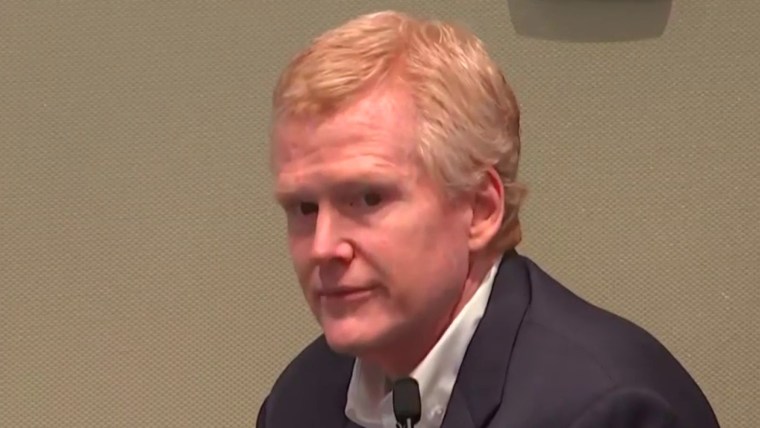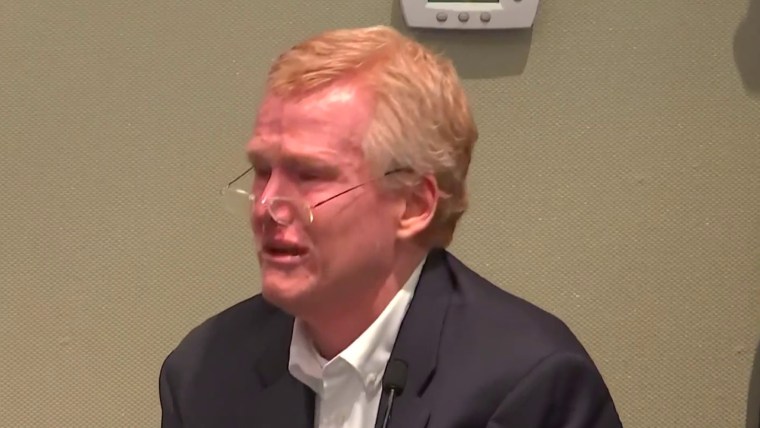Netflix’s latest villain Alex Murdaugh hurt himself by testifying
There’s a scene in the 1997 film The Devil’s Advocate where Keanu Reeves — former small-town attorney turned big-city legal gunslinger courtesy of Satan in the flesh, Al Pacino — delivers a (very offensive and argumentative) opening speech the jury in his client’s murder trial.
Reeves’ character bluntly tells the jury, “I don’t like Alexander Cohen,” referring to his client. “I don’t think he’s a nice person. I don’t expect you to like him. He was a terrible husband. … He betrayed the city, his partners, his employees. … I’m going to tell you some things throughout this process that will make you like him even less. But this isn’t a popularity contest; It’s a murder trial. … I want one of yours, this is it. One thing. I want you to ask yourself, isn’t liking this man reason enough to convict him of murder?”
We witnessed a real-life version of that scene unfolding in a South Carolina courtroom as accused double murderer Alex Murdaugh took the stand in his own defense last week. It was further underscored by an unflattering Netflix documentary that gave a no-holds-barred account of Murdaugh’s character, exploits and family heritage.
Just like the saying “doctors make the worst patients,” lawyers can make the worst clients in their own defense.
Once sworn to telling the truth and nothing but the truth, Murdaugh immediately confessed to the jury that he had lied to law enforcement, his family and the world at large for 20 months while denying he was physically present at the scene of the double murder of his wife and son in June 2021. Murdaugh tearfully explained that his addiction to painkillers made him “paranoid” and caused him to lie to investigators by originally claiming he last saw his wife and son at dinner and that he was not at the kennel/crime scene that bloody and violent night. Later, and only after video evidence showed he was actually present at the crime scene, did Murdaugh admit his earlier lies.
In another defense seemingly ripped straight from the playbook The Devil’s Advocate, Murdaugh’s attorneys, during a two-day direct inquiry And Cross-examination allowed him to freely admit that he had also repeatedly lied to dozens of clients while practicing law before practicing law, as well as to his legal partners, from whom he is accused of stealing more than $9 million in siphoned settlement funds. He repeatedly admitted that he had represented these individuals in cases, often involving grievous bodily harm or wrongful death, and that he would steal their settlement funds to pay for his lifestyle and drug addiction.
At the end of each take, Murdaugh told the jury that he knew what he had done was wrong and that he knew he was stealing from his clients in the process. The jury left at the end of each day with his confessions ringing in their ears. However, he repeatedly denied murdering his wife and son.
The decision to testify a criminal suspect is not easy to make; The potential for disaster usually far outweighs any true benefits. Before Murdaugh was disgraced and disfellowshipped, he had a long career as a trial attorney, which probably led him to believe he was smart and experienced enough to outwit and outmaneuver the prosecutor. But, just like the saying “doctors make the worst patients,” lawyers can make the worst clients in their own defense.
It should be noted that unlike other witnesses in this case, Murdaugh was also able to witness the entire multi-week trial to date, including, most importantly, the presentation of the main case to the prosecution, Before He made the decision to take a stand. In my opinion, that direct window into all the evidence presented so far must have been a huge factor in the calculus to have him testify in a criminal trial where he faces a mandatory minimum of 30 years of life imprisonment with no life parole should he should be convicted of the murders.
Murdaugh has already delivered a victory for the prosecution to have his trustworthiness, and therefore credibility, completely wiped out
In the present case, Murdaugh’s decision to make the witness a de facto confession cell creates even more potential for a conviction for the murders, because the jury could actually decide that he has to be guilty because they don’t like him. I contend that by doing so the jury would be failing in their duty as jurors to obey the law—but the reality is that regardless of what the law requires them to consider, it is basic human nature to judge. And juries do just that: they assess the credibility and trustworthiness of a witness testifying in court. Murdaugh has already delivered a victory for prosecutors to have his trustworthiness, and therefore credibility, completely wiped out by admitting to having built a house of cards on lies. Testifying in his own defense, he, not his attorney, has asked that jury to agree that he is a thief and a drug addict, not a murderer.
With Murdaugh looking the jury straight in the eye – just as he looked his former clients and legal partners in the eye when he lied to them – and testifying that he is an outright liar, he risks losing all of his credibility affect .
To complicate matters for Murdaugh’s defense team, Netflix released a limited documentary titled Murdaugh Murders: A Southern Scandal just days before Murdaugh testified. Just three episodes long, it’s a compelling in-depth look at the background of Paul Murdaugh (Alex’s son) and the lengths the family would go to to protect the family legacy, and how a good old network of influence led to money changing the Righteousness bought in the Lowcountry. The documentary focuses heavily on the 2019 boating accident that killed Mallory Beach and in which Paul Murdaugh was charged with boating under the influence and led to a $50 million wrongful death lawsuit against the Murdaughs . It is this wrongful death lawsuit that was the first of several dominoes to fall, ultimately leading to the indictment of Alex Murdaugh on more than 100 felonies, including insurance fraud and theft, as well as murder.
The series paints an exceptionally unflattering picture of the Murdaughs. Former friends and acquaintances reveal allegations of Paul’s underage drinking and unrelenting reckless behavior, as well as his verbal, emotional and physical abuse of his then-girlfriend and friends. The docuseries also shows the extent of Alex and Maggie Murdaugh’s empowering and questionable parenting when it comes to their son. Allegations of corruption and collusion with local law enforcement to protect Paul from the aftermath of this boating accident are brazenly made, including attempts to frame one of his childhood friends and the trail of destruction left in their wake by the Murdaugh family, is highlighted throughout episodes.
There is nothing positive about Alex Murdaugh in these documentaries, and although the jury was instructed not to watch or read about the myriad cases, should a juror deviate from those instructions, it would leave an even worse impression on the entire Murdaugh family. One gamble in the age of true crime entertainment is that lawyers are increasingly being forced to navigate the courtroom with high-profile criminal cases like this one.
At one point during his direct investigation, Murdaugh says, without apparent irony, “Oh, what a tangled web we weave,” as he admits to having fabricated lies upon lies to hide his theft and dishonesty with investigators. But he didn’t finish this quote: “…if we first practice deceiving.”
By his own admission, Murdaugh has a lot of practice at deception. And by taking a stand in his own defense, his practice of deception comes into its own. At his arraignment, Murdaugh was asked by the judge, “How will you be tried?” His reply, “By God and my country.” But lest he forget, he will also be tried in the court of public opinion, and by all accounts the verdict leans toward unqualified guilt.

